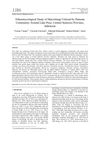 14 citations,
November 2020 in “International Journal of Biological Macromolecules”
14 citations,
November 2020 in “International Journal of Biological Macromolecules” Mushroom-based scaffolds help heal skin wounds and regrow hair.
 73 citations,
July 2016 in “Cosmetics”
73 citations,
July 2016 in “Cosmetics” Mushrooms have beneficial properties for skin and hair care products and have great potential for future cosmetic use.
 59 citations,
August 2014 in “International Journal of Biological Macromolecules”
59 citations,
August 2014 in “International Journal of Biological Macromolecules” The study found an efficient method to extract antioxidants from Hibiscus leaves.
 1 citations,
July 2023 in “Foods”
1 citations,
July 2023 in “Foods” Mushrooms offer benefits for food, energy, and water security, and have potential uses in health and environmental applications.
 1 citations,
August 2023 in “Frontiers in immunology”
1 citations,
August 2023 in “Frontiers in immunology” Traditional Chinese medicinal foods may help manage long-term post-COVID symptoms.
 125 citations,
December 2016 in “Molecules”
125 citations,
December 2016 in “Molecules” Substances from Chinese medicines show promise for immune support and disease prevention, but the way they are processed affects their effectiveness.
 2 citations,
March 2020 in “Journal of Pharmacognosy and Phytochemistry”
2 citations,
March 2020 in “Journal of Pharmacognosy and Phytochemistry” The Ganoderma mushroom has many health benefits, including anti-cancer properties.
 36 citations,
April 2019 in “Journal of Herbal Medicine”
36 citations,
April 2019 in “Journal of Herbal Medicine” Ganoderma lucidum, a medicinal mushroom, contains compounds that have potential health benefits like fighting cancer, boosting immunity, and treating various diseases.
23 citations,
January 2014 in “Evidence-based Complementary and Alternative Medicine” Mushroom beta-glucans from Ganoderma lucidum can reduce tumor size and metastasis in cancer.
 20 citations,
February 2009 in “Chemistry & Biodiversity”
20 citations,
February 2009 in “Chemistry & Biodiversity” Ganoderma lucidum may help treat prostate cancer by blocking male hormones and slowing cancer cell growth.
7 citations,
March 2013 in “Annals of Hematology” Ganoderma lucidum can cause severe skin reactions and hair loss.
 64 citations,
March 2006 in “Food Chemistry”
64 citations,
March 2006 in “Food Chemistry” The triterpenoids from Ganoderma lucidum can block testosterone effects and may help treat enlarged prostate.
1 citations,
May 2024 in “Applied Sciences” Cordyceps militaris is a promising, cost-effective medicinal fungus with health benefits and efficient production methods.
 2 citations,
September 2022 in “Cellular and molecular biology”
2 citations,
September 2022 in “Cellular and molecular biology” Agaricus bisporus derived β-Glucan could be an effective cervical cancer treatment with antimicrobial and antioxidant properties.
 March 2024 in “Jordan Journal of Biological Sciences”
March 2024 in “Jordan Journal of Biological Sciences” The Pamona community uses 21 types of mushrooms for food, medicine, and other needs, highlighting the importance of conserving these resources.
83 citations,
August 2020 in “Resources” Macroalgae compounds offer sustainable, effective benefits for cosmetics.
9 citations,
May 2021 in “Frontiers in aging neuroscience” Taking triterpenoids from Ganoderma lucidum over a long time can help slow down brain aging and improve overall health in mice.
 14 citations,
August 2009 in “Cancer epidemiology”
14 citations,
August 2009 in “Cancer epidemiology” AHCC reduces hair loss and liver injury caused by chemotherapy in rodents.
 14 citations,
January 2019 in “Journal of Natural Medicines”
14 citations,
January 2019 in “Journal of Natural Medicines” Chaga mushrooms contain compounds that may promote hair growth better than common treatments.
 421 citations,
January 2015 in “Chemical Society Reviews”
421 citations,
January 2015 in “Chemical Society Reviews” Improving artificial vascular grafts requires better materials and surface designs to reduce blood clotting and support blood vessel cell growth.
 233 citations,
February 2018 in “Polymers”
233 citations,
February 2018 in “Polymers” Chitin and chitosan are useful in cosmetics for oral care, haircare, and skincare, including UV protection and strength improvement.
 170 citations,
September 2019 in “Evidence-based Complementary and Alternative Medicine”
170 citations,
September 2019 in “Evidence-based Complementary and Alternative Medicine” Some medicinal plants can help heal wounds and may lead to new treatments.
 41 citations,
July 2015 in “Current Drug Discovery Technologies”
41 citations,
July 2015 in “Current Drug Discovery Technologies” Some plants may help with hair growth and have fewer side effects than synthetic drugs, but more research is needed to confirm their effectiveness.
 39 citations,
June 2017 in “Journal of Applied Research on Medicinal and Aromatic Plants”
39 citations,
June 2017 in “Journal of Applied Research on Medicinal and Aromatic Plants” Plant-based ingredients are effective and safe for modern skincare products.
 32 citations,
January 2021 in “Molecules”
32 citations,
January 2021 in “Molecules” Some Middle Eastern plants may help treat diabetes and could be alternatives to current drugs, but more research is needed.
 27 citations,
June 2015 in “Revista Brasileira de Farmacognosia”
27 citations,
June 2015 in “Revista Brasileira de Farmacognosia” Safflower has been used in traditional medicine for centuries and shows promise in treating heart, brain, and inflammatory conditions, but more research is needed to ensure its safety.
 22 citations,
August 2011 in “Journal of Supercritical Fluids”
22 citations,
August 2011 in “Journal of Supercritical Fluids” Rice bran extract might help prevent hair loss.
 2 citations,
October 2022 in “International journal of Ayurvedic medicine”
2 citations,
October 2022 in “International journal of Ayurvedic medicine” Licorice has many traditional health benefits, but more research is needed to fully support these claims.
 1 citations,
January 2013 in “Springer eBooks”
1 citations,
January 2013 in “Springer eBooks” Cosmeceuticals may benefit skin health but need more research for efficacy and safety confirmation.
 January 2002 in “Journal of Toxicology-cutaneous and Ocular Toxicology”
January 2002 in “Journal of Toxicology-cutaneous and Ocular Toxicology” Botanical extracts are increasingly important in cosmetics and drugs for their effectiveness and safety, backed by traditional use and scientific evidence.
























